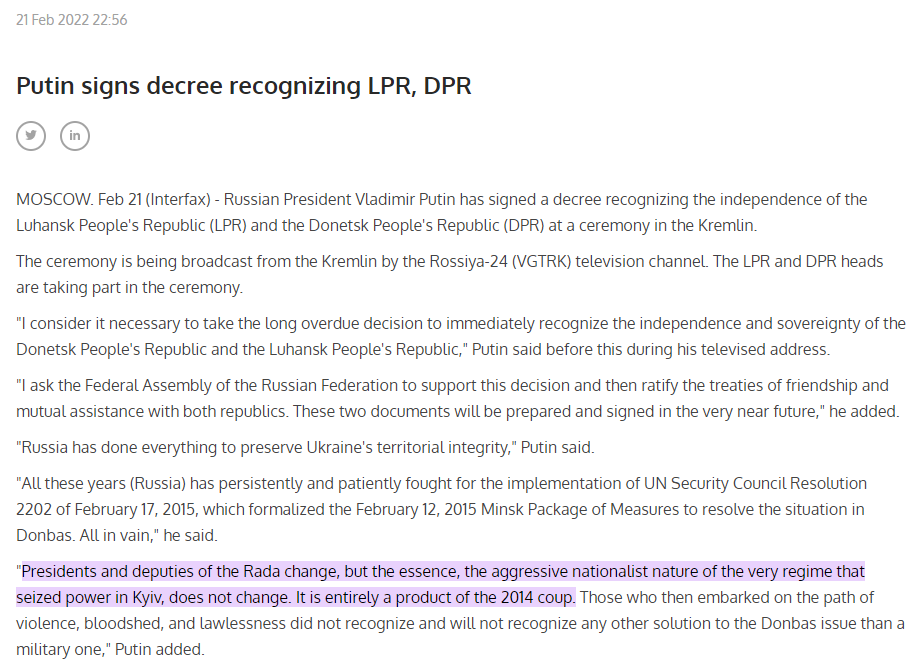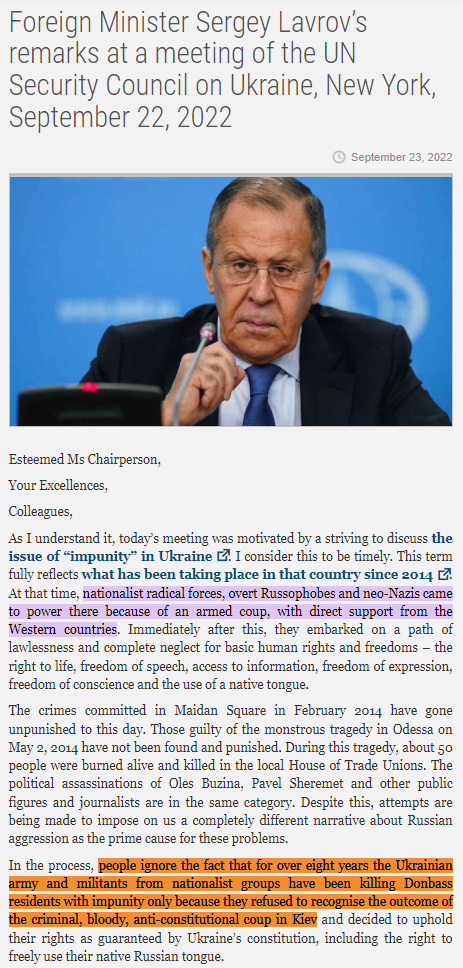Previous Subchapter → 6.5. The Ukraine Creation Myth
Alongside historical myths, Russian leaders also love to refer to more recent grievances to try and justify their actions, specifically Ukraine’s constitutional crisis in 2014, where Ukrainian President Viktor Yanukovtch was illegally ousted and replaced by a so-called “interim government” consisting of his opponents.
Despite the fact that the so-called “interim government”, didn’t last long and was followed by successive elected governments, in the propaganda line of Russia these governments are still illegitimate, tainted by the 2014 coup and still suffering a legitimacy crisis, with Russian officials and aggregators referring to the Ukrainian government as the “Kiev regime”.


And there is, in a way, some weight to this idea, it’s a simple matter of fact that whatever you think about Yanukovytch, he wasn’t removed from power legally, so how legitimate are the elections that followed his removal if they were organised by authorities that had no such mandate? This is a genuine question that can be asked.
But the irony in this logic is that it can be applied to Russia as well, as mentioned in the second episode of this series the current Russian constitution, established in 1993, didn’t come into force by legal, democratic means, it came about through a coup, where Boris Yeltsin illegally abolished the Russian parliament and constitution, then formed a new one to push through the reforms he wanted, in order to do this he used military force against the parliamentarians that opposed him, despite having no right to do as he pleased, Yeltsin made sure to take what he wanted with might, with Russia later inheriting a system that was born through crime. Putin took notes, having been Yeltsin’s Vice President and his successor to the Presidency. If we follow the logic of the Russian authorities consistently, they are tainted by a legitimacy crisis and have no real right to complain if separatists emerge and try to secede, if Ukraine needs a “denazification” perhaps Russia needs a “deyeltsification”.
So how do we answer this legitimacy question? Well, the answer is actually quite simple, almost no constitution or legal system has legally replaced its predecessor, the Russian Federation didn’t legally replace the Russian Soviet, but the Russian Soviet didn’t legally replace its predecessor the Russian Empire either, this doesn’t “taint” the legitimacy of any of these states, because the legitimacy of laws and constitutions are defined from only one source, the populations they represent.
Because there’s no other source we can really look to, it used to be religion, governments originally claimed their right to power from the will of God, this idea was called the divine right of kings, but with the advent of more religiously diverse and secular societies this idea has gone out of fashion, so we only really have 2 alternatives, circular logic - the law is the law because it’s the law, or popular consent - the law is the law because people accept the rule of law, only one of these alternatives makes any sense, so what differentiates an illegitimate authority from a legitimate one is the will of the people.
The Ukrainian people accept Zelensky’s right to be their president, so he has the right to be their president, that’s all there is to it, there is no legitimacy crisis, no “Kiev regime”, just a government, the Ukrainian government, which has as much of a right to exist as that of its neighbours.
And this is a fact the Russian leadership is quietly aware of when you look behind the propaganda smokescreen, because after Yanukovytch was ousted they accepted the results of the elections that followed, and we can’t forget that Russia annexed Crimea in a process completely counter to the Ukrainian constitution, so their appeals to legality are obviously paper thin.